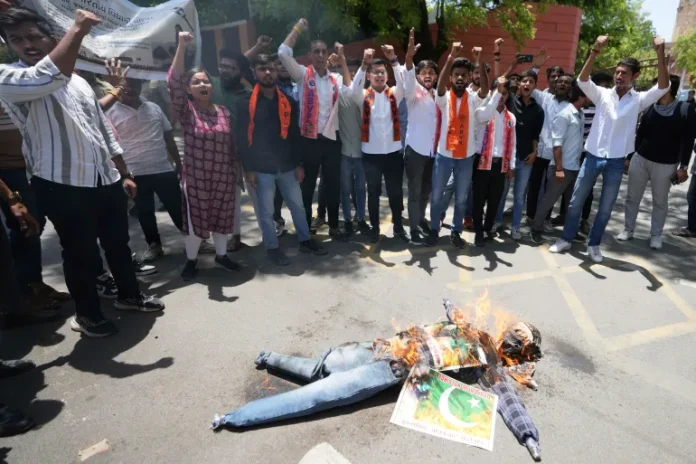Mumbai – A surge of incendiary music tracks and digital content with Islamophobic themes has emerged across India in the aftermath of the April 22 Kashmir attack, further intensifying communal tensions and triggering real-world violence against Muslims.
The attack, which claimed the lives of 25 Hindu tourists and a local Muslim pony rider in Pahalgam, has become the backdrop for an alarming spike in anti-Muslim sentiment, particularly through a genre of music now known as “Hindutva Pop.” These songs, many of which appeared online within hours of the incident, are being widely circulated on YouTube and encrypted messaging platforms, promoting communal hatred and advocating violence.
One song, titled “Pehle Dharam Pocha” (They Asked About Religion First), blatantly calls Indian Muslims traitors and demands their departure from India. It has garnered over 140,000 views in less than a week. Another track, “Ab Ek Nahi Huye Toh Kat Jaaoge” (Unite Now or Be Slaughtered), directly appeals to Hindus, warning of existential threats if they do not unite. Yet another song, “Modi Ji Ab Maha Yudh Ho Jaane Do” (Modi Ji, Let the Great War Begin), refers to Muslims as “snakes,” invoking militant imagery and calls for war.
Al Jazeera identified at least 20 such songs uploaded since the attack, all of which reinforce a narrative portraying Muslims as a danger to Hindus. Some songs feature AI-generated reenactments of the Pahalgam shooting, further inflaming public sentiment.
The digital hate campaign mirrors a disturbing pattern of offline violence. The Association for Protection of Civil Rights (APCR) has documented at least 21 incidents of anti-Muslim hate crimes and intimidation in multiple states including Uttar Pradesh, Maharashtra, Haryana, and Uttarakhand. These include assaults, evictions, denial of medical treatment, and public hate speeches.
On April 25, a Muslim man was shot dead in Agra by a Hindu supremacist who cited the Pahalgam killings as justification. In Mumbai, BJP leaders were booked for assaulting Muslim vendors. In Jaipur, offensive posters were pasted inside the Jama Masjid by a BJP legislator during anti-Pakistan protests.
BJP leaders and affiliates of its ideological allies like the Vishwa Hindu Parishad and Bajrang Dal have also been linked to calls for economic and social boycotts of Muslims. Maharashtra BJP minister Nitesh Rane openly urged Hindus to refrain from buying goods from Muslims, stating, “Why should we make them rich?”
Digital platforms like WhatsApp and YouTube have become breeding grounds for this hate-filled propaganda, with videos featuring singers in military fatigues, visuals of simulated warfare, and AI-generated memes comparing the Kashmir attack to the Israel-Hamas conflict, calling for “revenge the Israel way.”
Raqib Hameed Naik, Executive Director of the Washington DC-based Center for the Study of Organized Hate (CSOH), said there has been a “sharp spike” in anti-Muslim rhetoric since the attack. “This campaign is systematically designed to inflame passions, justify exclusion, and normalize violence,” he warned.
Amid this atmosphere, civil rights groups like APCR are providing legal aid to victims and raising alarm over the orchestrated spread of hatred that has brought the nation to “a boiling point.”
As India grapples with grief over the Kashmir tragedy, growing calls for retribution, communal songs, and street-level violence raise urgent questions about hate speech, political complicity, and the safety of its minority citizens.




